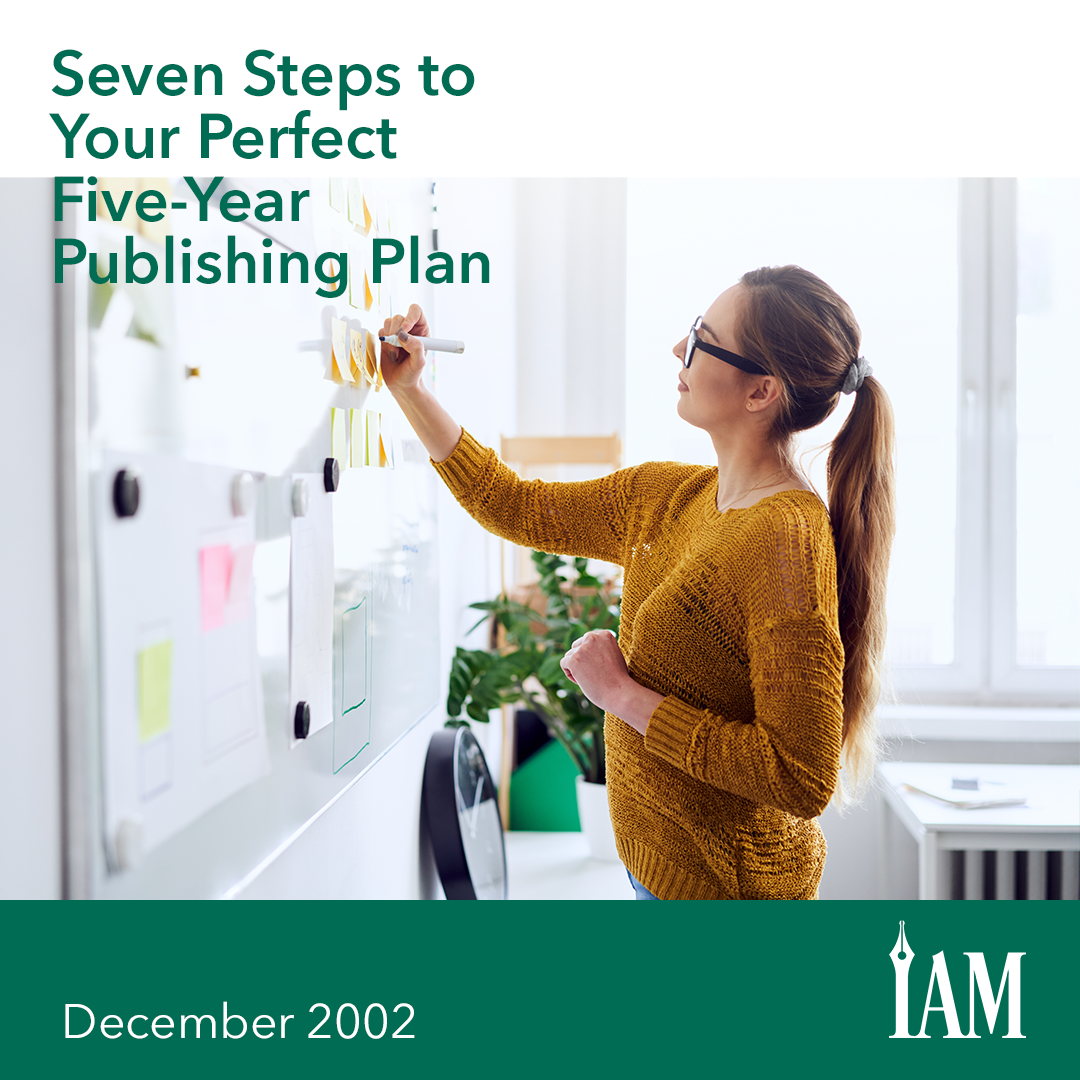Planning Your Author Career: A Strategy for the Next Five Years
It’s almost the end of another year and time once more for setting intentions for the future. But don’t reach for a soapbox about New Year’s resolutions or dust off your schemes for world domination just yet. However well you think these goals work in your personal life, the new year can also be the perfect opportunity to map out a path for your author business over the next five years.
We can hear the groans now. Drawing up a five-year plan sounds boring, business-like, and not at all creative. But if you want to treat your author career like a business, well, it’s a necessity. Proper planning, even if it’s kept basic at the start, is a must for selecting the right goals and for seeing them realized.
A five-year plan is simply a map to get you from where you started to where you want to be. For new authors, the first year of your plan might entail the more mundane process of setting up your author business, including choosing a company structure, such as an LLC or DBA. It might include designing a logo, planning your website, setting up social media, or researching your chosen genre or genres. Your plan is likely to change as you come across things you didn’t even know to consider and as you learn how you work as an author, how fast you write, and what’s realistic for you. For experienced authors, creating a five-year plan is more likely to be about moving yourself up to the next level. You’ll be well past the basics and on to building your author brand, building your team, growing your audience, and increasing your monthly and yearly income. Your plan is more likely to include tasks such as arranging for translations or audiobooks, licensing, considering new genres, building your mailing list, running paid ads, creating additional streams of income, or organizing movie or TV deals.
Still, no matter where you are in your career, a five-year plan is useful for keeping you on track, keeping you focused on your goals, and preventing overwhelm.
1. Dream a little dream
Where do you want to be in five years’ time? What do you want to have achieved?
These questions might seem vague, but knowing how you’d answer them is essential as you draft your five-year plan. This is the time to let your imagination go wild. You can plan and be practical later, but for now, enjoy picturing yourself polishing your future awards or moving bespoke furniture into your dream house. Get into the details, and imagine how you’d feel.
Build up a picture of where you’ll be in five years, and write it down at the top of your page. This will help you find the target you’re aiming for.
Speaking of fun, make your planning an enjoyable process, and one that’s unique to you. Although it may sound like something a corporate exec would do—and it is—it doesn’t have to be boring. Use stickers, stars, and washi tape to organize your page, or if you’d prefer, type into an online document, lay it out in a spreadsheet, or use organizational software. Monday.com offers a free template on its blog that you can fill out or use as inspiration in formatting your own document. You can also find five-year planners online that include full diaries, calendars, notes, space for sketching, goal worksheets, yearly goal planners. Some are bound books, but if you’d like more customizable options, some offer printable worksheets so you can select what you find most helpful and organize it as you see fit.
Your five-year plan should be as much a source of inspiration as it is organization, so paste in images of the house you want to buy with your royalties or scribble in quotes from authors who’ve made it to where you want to be. Include rewards at certain milestones for meeting your goals, and remember that in the long term, keeping yourself motivated while working toward your chosen end goal will be just as important as the plan you’re crafting now.
2. Choose your goals
When you put together a five-year plan, you need to know your ultimate end goals for year five, but you also need to have goals for each year that lead to achieving your ultimate goals. If you want to hit six figures in year five, for example, you need to understand what activities, tasks, and events will get you there and ensure that these things are in your planner at the right time of each month and year.
Add these milestone goals to your planner to break your objectives into more manageable chunks, as well as to give yourself a way to stay accountable and keep track of your progress.
When you choose your goals, be specific. Include dollar amounts for how much you’d like to earn or the number of titles you’d like to have published. It’s far better to say that you want to earn $500,000 a year by year five than it is to say that you want to have more than enough money to pay your bills. The second option is too wooly and unclear, and you won’t be able to adequately measure your progress down the road.
3. Build around existing plans
Before you break down the steps you’ll need to make toward your objective each year, consider your current commitments. Add any conferences, book signings, speaker opportunities, courses that you’ll be taking, and/or firm book release dates and deadlines. If you’ve already booked any vacations, include those too.
Once existing plans are in, it’s easier to work out what happens on the run up to each event or release. It’ll also make it easier to understand your availability to work on additional projects throughout each year and the steps you’re already taking toward your larger goals.
4. Plan your book publishing schedule
It may be tempting to fill your year with tasks and to-dos, but be honest when setting deadlines about how fast you finish a book and how many books you’re likely to publish in one year. Experienced authors are likely to have this down, but newer authors may not know how long they need to write a book. If you’re new, start with a very flexible plan that you can adjust as you learn, and try not to overcommit yourself. It’s better to only plan two books for this year and beat your goal than it is to plan ten and only manage five.
Your plan is there to help you meet your goals, and no one else has to know what it says. Other authors are not your competition, so focus on your goals and priorities, and make sure they’re reasonable for your writing speed. The alternative won’t help you reach your goals any faster and could in fact work against you over time, affecting your mental health and/or leading to burnout.
5. Work backward
Once you have your major events and releases written for the next five years, it’s easier to look at each one and work backward on your plan to figure out where you need to start. Break each target into small, manageable tasks that you can complete step by step.
Something like “write book” won’t help you understand the amount of work you need to accomplish or where to start, but steps like “complete outline,” “update bio,” “write blurb,” and “add new preorder” are easier to approach and will keep you from feeling overwhelmed. Add these onto your calendar in whichever order works for you, ensuring you’ve left enough time to get everything done.
As you fill out your schedule, include time for beta readers, the various stages of editing, ARC readers and reviews, and marketing, and keep in mind that you may need to adjust your schedule at a later date based on things like your editor’s availability. It might be best to plan in pencil first so you can erase or reorganize your schedule closer to the date.
6. Allow for “You Time”
No author can write or work on publishing-related tasks seven days a week, 365 days a year. You can try, but you will inevitably write yourself toward burnout.
As tempting as it is to fill your schedule to the brim and imagine how much you could accomplish, it’s just as important to schedule times for rest throughout the year. Consider that you’re going to want vacation time during the next five years, and there are likely to be significant personal events, such as family weddings or big birthdays, that you’ll want to attend.
Maybe you want to take more time writing your books so you can have evenings and weekends free, if you’re a full-time author. Maybe you know you need a week to recover when you’ve finished your latest book, or even a month. Think about what you need to work at your best, and plan to provide yourself with that.
Your plan should help your writing fit in with your life while still getting everything done and not allow it to take over entirely.
7. Remain flexible
In any long-term schedule, you’ll need to allow for some wiggle room. Life happens. Your schedule might need to be adjusted if you or a family member get sick. You might find you have free time suddenly if a book falls through or gets pushed back, or you might have the perfect opportunity fall into your lap two years down the road—something you never would’ve thought to plan for, yet something you just can’t turn down.
Don’t make your schedule air-tight. Allow yourself some breathing room in between books, just in case. Plan a little extra time to meet your deadlines so you don’t have to push yourself harder than you like to work.
As you build out your schedule, add your must-do book projects first. You can then add a couple of extras toward the end of the year that would be nice to work on if you have the time. This gives you the freedom to drop the optional projects if something unexpected comes up without causing a problem or feeling guilty for not completing everything the way you’d intended.
Finally, don’t stress if you aren’t able to stick completely to your plan. Your schedule shouldn’t be a rigid guilt-trip of a document, glowering at you from the shelf and sighing in disgust every hour it isn’t touched. It’s meant to be a genuinely helpful, flexible outline that works for you and with you in growing your business.
Adjust if needed, and don’t worry about needing to alter your course of action. Your plan is a guide toward your bigger goals each year, but there’s no right path for how to reach them. As long as you continue making progress, you’ll find that, no matter how long it takes, hitting your goals will push you to aim even higher.
No one can know for sure where they’ll be in the next five years. But with a well-considered plan in hand, you’ll already be one step closer to hitting your goals and building a successful author career that works for you.











